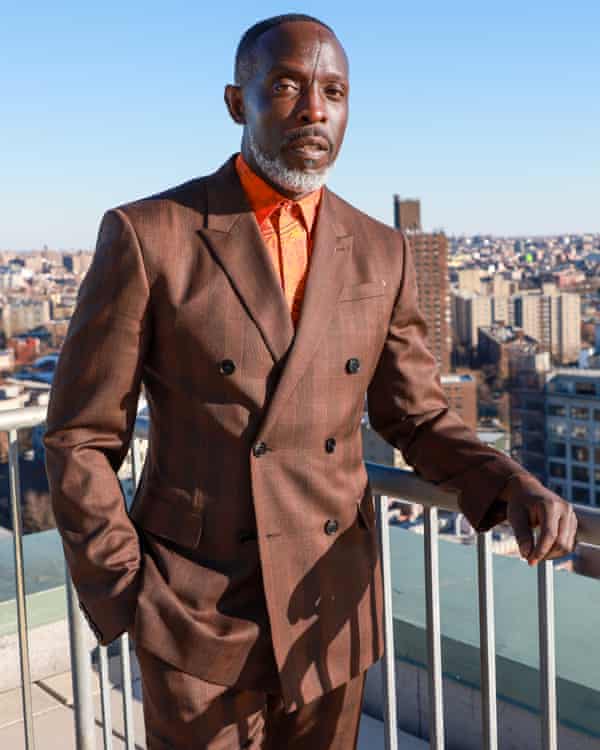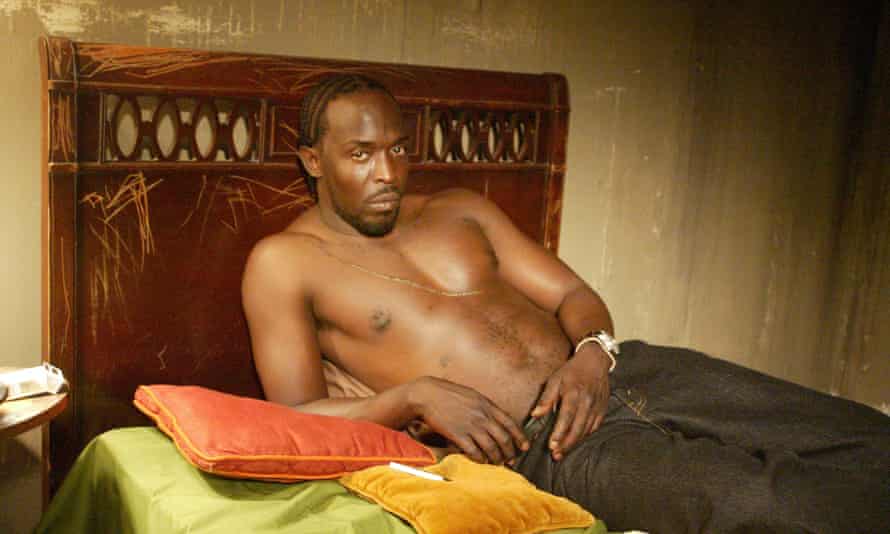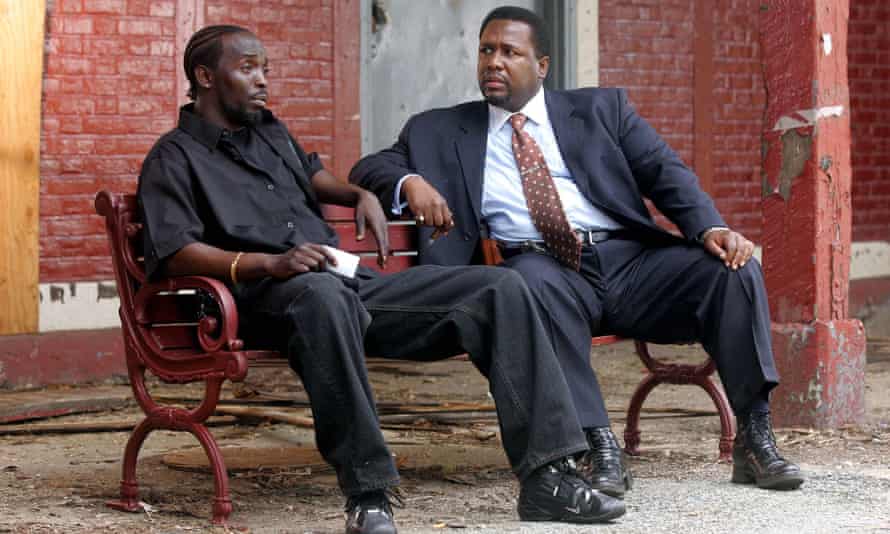 |
| ‘A man’s gotta have a code’ … Williams as Omar; the actor died this week. Photograph: Paul Schiraldi |
‘I got the shotgun. You got the briefcase’ – how The Wire’s Omar changed TV
Barack Obama Stands by His Correct Pick of Omar Little As the Best Wire Character
Omar Little is the gay stick-up man who robs drug dealers for a living in The Wire
Michael K Williams / The Wire star remembered as 'a fine man and a rare talent'
Obituaries / Michael K Williams
Paul Owen
Tuesday 7 September 2021
P
It was a moment that subverted audience expectations and signalled the complexity, ambition and depth that The Wire – which is often placed at or near the top of lists of the all-time greatest TV shows – was aiming to achieve. This is not a character you’ve seen before, the show seemed to be saying. These aren’t your usual stereotypes and cliches. A similar moment saw Idris Elba’s drug chief Stringer Bell attend a business studies class.

Omar’s kiss had not been in the script. “I remember somebody immediately saying, ‘There go our ratings’,” Ed Burns, co-creator of The Wire, told the New York Times. “That sort of intimacy was not shown much then, but Mike insisted, and it breathed life into the character.”
“Omar definitely helped soften the blow of homophobia in my community,” Williams – who died on Monday aged 54 – said in 2019 of the East Flatbush neighbourhood of Brooklyn where he grew up. “And it opened up a dialogue, definitely.”
Omar went on to become the moral centre of the programme – to the extent that Barack Obama famously felt able to describe this professional thief as his favourite character. “That’s not an endorsement,” the then-presidential candidate added prudently. “He’s not my favourite person but he’s a fascinating character.”
Indeed, as Omar would say. A Robin Hood-style antihero who makes a living robbing drug dealers, he represents a point of idiosyncratic moral certainty in an amoral world. “A man got to have a code,” he says: “Don’t get it twisted, I do some dirt too, but I never put my gun on no one who wasn’t in the game.” In one memorable moment, he erupts with fury when he is attacked while taking his grandma to church on a Sunday morning, having believed “ain’t no need to worry, ’cause ain’t nobody in this city that lowdown to disrespect a Sunday morning!”
The iconography created for the character was uniquely memorable. “Omar comin’!” kids yell as he arrives whistling his unexpectedly threatening signature tune The Farmer’s in His Den (known in the US as The Farmer in the Dell). He is given some of the show’s most important lines. “I got the shotgun, you got the briefcase,” he tells a lawyer whom he views as just as much a part of the drug world as he is, wearing an impudent and phallic tie over his bomber jacket.

“You come at the king, you best not miss,” he tells his enemies after a failed attempt on his life – a line sold, as always, with Williams’s indelible combination of menace and charm.Omar walks the streets wearing just his silk pyjamas to search for Honey Nut Cheerios, his favourite breakfast cereal, protected only by his fearsome reputation. And yet when he dies, he is killed by an irrelevant young kid in a moment meant to illustrate the brutality and meaninglessness of life in district of Baltimore. His role on the streets is eventually taken in the final episode by another complex character, Michael Lee (played by Tristan Wilds), illustrating the programme’s deterministic view that a person’s life is inescapably shaped and controlled by the social structures and institutions they live under.
Despite the superstardom attained by Elba, many of The Wire’s impressive young black actors – who, like Williams, had in their early careers often been limited to generic roles – were unable to find again such substantial parts. It took Williams a while, but he eventually went on to other chunky roles in prestige TV shows such as Boardwalk Empire and The Night Of as well as smaller parts in films such as 12 Years a Slave, Gone Baby Gone and The Road. He received five Emmy nominations, including one this year for his role in Lovecraft Country.
But he was always inseparably associated with Omar Little, a once in a lifetime part. After beginning to make a name for himself with The Wire, Williams, a former dancer for George Michael and Madonna who was the son of a Bahamian mother and an American father, returned to his apartment in East Flatbush, Brooklyn, where he found locals who had once harassed him now greeting him as Omar: “No one was calling me Mike ... That’s when the lines got blurred,” he said.
It led to an identity crisis. “Mike is a beautiful man, but a gangster he is not,” David Simon has said. Williams struggled with cocaine abuse throughout the rest of his career, doing drugs, as he put it, “in scary places with scary people”.
“I was playing with fire,” he said in 2012. “It was just a matter of time before I got caught and my business ended up on the cover of a tabloid or I went to jail or, worse, I ended up dead. When I look back on it now, I don’t know how I didn’t end up in a body bag.” His death is reportedly being investigated as a possible drug overdose.
Williams was so high when he met Obama in 2008 he was unable to speak. But the meeting with the future president had a decisive impact on him. He later recalled: “Hearing my name come out of his mouth woke me up. I realised that my work could actually make a difference.” As well as taking roles in productions that focused on the criminal justice system, such as The Night Of and When They See Us, he was the American Civil Liberties Union’s ambassador for ending mass incarceration, and fronted and executive produced a documentary series about illegal livelihoods with Vice, Black Market – something he called his “most personal project”.
However, it was his embodiment of Omar that really faced the US with the true human cost of the carnage in some of its inner cities, and how it truly feels to be on the frontline. On Tuesday, Wendell Pierce, who played Bunk, his adversary in the Baltimore police force, tweeted a piece of video from 2014 in which he pays tribute to Williams while his co-star is standing next to him.
Pierce says: “He is one of the great American actors, giving voice and giving flesh to characters that most people would have never given the same humanity to. Opening a window to a world of men that we pass by or don’t know about … Art is the place where we reflect on who we are and he has made people think twice and give humanity to these men.” In that achievement lay Williams’s brilliance.
Omar’s greatest scenes
He was fearsome, funny when the mood took him and – for a drug-robbing stick-up man working the streets of Baltimore – surprisingly moral. Here, Phil Harrison picks five of his greatest moments.
Bird’s Trial (season one)
In one of the greatest courtroom scenes in TV history, Omar testifies against Bell/Barksdale heavy Bird. Bird’s solicitor Levy calls Omar “a parasite”, preying on the sickness of the city. Omar stops him in his tracks. “Just like you man … I got the shotgun and you got the briefcase. But it’s all in the game.” The moral heart of The Wire lies in this single exchange.

On the bench with Bunk (Season three)
Omar vs Stringer (season three)
“If you come at the king, you best not miss”. Omar’s rage towards the Bell/Barksdale organisation was fuelled by their challenge to his primacy on the streets. But it also had roots in the torture inflicted on his lover Brandon by their henchmen. Omar’s sexuality was a revolutionary piece of writing, brilliantly realised. He was simultaneously an alpha male in one of the toughest neighbourhoods in the US and a gay man who saw no reason to care who knew it.
Honey Nut Cheerios (season four)
He’s only nipped out for some cigarettes and some breakfast cereal. But by now, Omar’s name goes before him. Strolling languidly along in his silk pyjamas, Omar – or rather his reputation – clears the streets. He gets his Honey Nut Cheerios, his cigarettes, and, without even trying, a bin liner full of crack phials too.
Death (season five)
Omar’s death was sudden and horribly arbitrary. Despite goading the most dangerous gangsters in Baltimore, he dies at the hands of a child who is so small he can hardly get his fingers around the trigger of the gun he’s holding. His ending is ignominious – his body isn’t even correctly tagged in the mortuary. He was just another anonymous black victim of drug violence. Of course, we knew he was so much more than that. As, it was implied, were all the show’s victims.
THE GUARDIAN

No comments:
Post a Comment